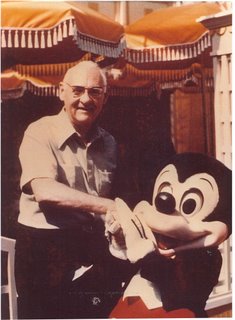Wednesday, December 20
Excellent Article

Father Balthasar, you've just won Theology Bowl MVP. What are you doing now?
I'm going to Disneyland!
In reading sections of Aidan Nichols' new book Scattering the Seed, I discovered an article that Balthasar wrote in 1939 called "The Fathers, the Scholastics, and Ourselves". This article is excellent in many ways, most notably for the way it challenges (successfully, I think) the Ressourcement to take Scholasticism seriously by critiquing tendencies towards a romantic exaltation of the Fathers over and against later theology. The impact of this critique can be seen most especially in de Lubac's work on the supernatural, where he goes precisely into a rigorous study of Scholastic thinkers in order to critique and undermine certain positions taken by later Scholasticism.
Balthasar also, I think, proposes an intelligent way forward for integrating the knowledge of the past into the theology of the present and future without being either iconoclastic or idolatrous with respect to that past. This is one area, I think, where Catholics have been especially ill-served by many of the mainstream "liberal" and "conservative" positions since the Second Vatican Council. On the one hand, there was an embrace of novelty that failed to adequately integrate the tradition, and indeed saw this tradition as being dead in the water. On the other, there was a tendency to cling to a triumphal view of Scholasticism, in which theology had essentially found its culmination in the works of Thomas Aquinas, and indeed in a certain reading of Thomas Aquinas that tended towards emphasizing the Aristotelian aspect of his work. The general arc of this line tended to emphasize the notion that Scholasticism was more or less common sense, and that anything after was a turn away from this golden mean. This kind of story arc tended first of all to ignore the very complicated nature of thought in the Middle Ages (and indeed the Augustinian and Dionysian aspects of Thomas' thought), and the fact that Aristotelian logic and science are not infallible guides.
Neither of these solutions was particularly helpful for healthy theological development in the Church, and it was precisely thinkers like Balthasar, de Lubac, and Etienne Gilson (with his return to the "historical Thomas Aquinas") who helped to bring about a new and better synthesis. This hard work, which often met strong opposition from both extremes (and indeed still does in some cases), now bears its fruit in the theological vision of Benedict XVI, which spurns neither Scholasticism nor modern theological developments, but takes, as Balthasar did, the approach of St. Paul: "Test everything, hold fast to what is good." (Also, incidentally, the title of an excellent book-length interview of Balthasar conducted by Angelo (now Cardinal) Scola).












